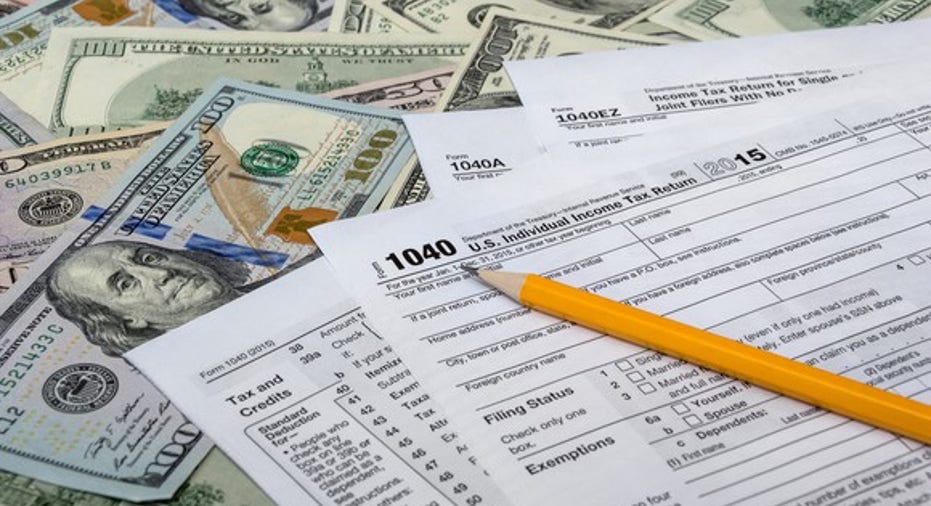Short-Term Capital Gains Tax Rates in 2017

Just as you're required to pay taxes on the salary you earn, so too must you give the IRS its cut any time you make money from the sale of an investment. Now you're not obligated to pay taxes on an investment until you actually sell it for a price that's higher than what you paid. If you hold 100 shares of a certain stock that you bought for $5 apiece and the price climbs to $8, you'll only have to report and pay taxes on your gain if you actually sell those shares. But if you are going to sell an investment at a profit, you should know that the amount of time you hold it will impact the extent to which you're taxed.
Short-term capital gains taxes
Any time you make money from an investment you've held for a year or less, you'll be subject to short-term capital gains taxes. Short-term capital gains are the same as ordinary income, which means that if you typically lose 25% of your paycheck to taxes, you'll pay the same amount on investments held for less than a year and a day.
IMAGE SOURCE: GETTY IMAGES.
Here's what the current short-term capital gains tax rates look like:
|
Tax Bracket |
Income Range: Single Tax Filers |
Income Range: Married Filing Jointly |
|---|---|---|
|
10% |
$0-$9,325 |
$0-$18,650 |
|
15% |
$9,326-$37,950 |
$18,651-$75,900 |
|
25% |
$37,951-$91,900 |
$75,901-$153,100 |
|
28% |
$91,901-$191,650 |
$153,101-$233,350 |
|
33% |
$191,651-$416,700 |
$233,351-$416,700 |
|
35% |
$416,701-$418,400 |
$416,701-$470,700 |
|
39.6% |
$418,401 and above |
$470,701 and above |
DATA SOURCE: IRS.
While these numbers represent the current system, you may not want to get too comfortable with them. President Trump has proposed a more simplified tax system that whittles the above brackets down to just three, as follows:
|
Tax Bracket |
Income Range: Single Tax Filers |
Income Range: Married Filing Jointly |
|---|---|---|
|
12% |
$0-$37,500 |
$0-$75,000 |
|
25% |
$37,500-$112,500 |
$75,000-$225,000 |
|
33% |
$112,500 and above |
$225,000 and above |
DATA SOURCE: DONALDJTRUMP.COM.
In addition, Trump has indicated that he'll keep the current capital gains rules in place but apply them to his new brackets. If his plan takes effect, short-term capital gains rates will mirror those listed above.
Short-term versus long-term capital gains
Sometimes it makes sense to sell an investment that you've held for a year or less. But if you have the opportunity to hold your investments longer, you'll lose less money to taxes. That's because long-term capital gains -- those that apply to investments held for at least a year and a day -- are taxed at a lower rate than short-term gains.
Here's what the current long-term capital gains tax rates look like:
|
Tax Bracket |
Long-Term Capital Gains Tax Rate |
|---|---|
|
10% |
0% |
|
15% |
0% |
|
25% |
15% |
|
28% |
15% |
|
33% |
15% |
|
35% |
15% |
|
39.6% |
20% |
DATA SOURCE: IRS.
As you can see, under the present system, the majority of tax filers pay anywhere from 0% to 15% on long-term gains. Only the wealthiest investors pay 20%. Either way, these numbers are considerably lower than their short-term counterparts.
As an example, say you take in a $5,000 gain in a given tax year and normally fall into the 28% tax bracket. For a short-term gain, you'll lose $1,400 to taxes, but if you hold that investment long enough to qualify for the long-term capital gains rate, you'll pay just $750 in taxes.
Now once again, we do need to take President Trump's proposed tax changes into account when discussing long-term capital gains, but here's what the rates would look like if his plan goes through:
|
Tax Bracket |
Long-Term Capital Gains Tax Rate |
|---|---|
|
12% |
0% |
|
25% |
15% |
|
33% |
20% |
DATA SOURCE: DONALDJTRUMP.COM.
Whether you're looking at the current tax tables or the ones Trump wants to push through, you'll pay less tax on investment gains by holding assets long enough to qualify for the more favorable long-term rate. That said, it doesn't always pay to hang onto investments just to lower your tax bill. If selling an investment sooner will ultimately result in a much larger profit, it generally pays to take the tax hit if you'll still come out ahead overall.
The $16,122 Social Security bonus most retirees completely overlook If you're like most Americans, you're a few years (or more) behind on your retirement savings. But a handful of little-known "Social Security secrets" could help ensure a boost in your retirement income. For example: one easy trick could pay you as much as $16,122 more... each year! Once you learn how to maximize your Social Security benefits, we think you could retire confidently with the peace of mind we're all after.Simply click here to discover how to learn more about these strategies.
The Motley Fool has a disclosure policy.



















